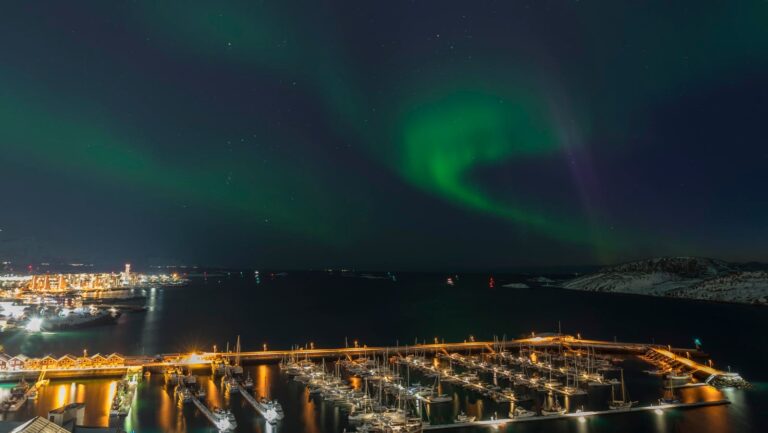Three small European cities you may never have heard of will soon be in the cultural spotlight as Europe’s latest capitals of culture.
Tartu in Estonia, Bad Ischl in Austria and Bodø in Norway will present a year of cultural events, showcasing their rich history and diverse traditions to visitors from across Europe and the world.
Celebrating European cultural heritage
Launched in 1985, European Capitals of Culture is an EU initiative designed to celebrate Europe’s multifaceted cultural heritage. Each year, selected cities receive this prestigious title, offering them the opportunity to present their art and culture, but also to regenerate their territories and strengthen tourism.
The chosen cities spend years organizing special events, festivals, exhibitions and shows for the year. More than 60 cities have so far been chosen for the title, with Greece’s Eleusis, Hungary’s Veszprém and Romania’s Timișoara currently enjoying their year in the spotlight.
Tartu: academic heritage in Estonia
The second largest city in Estonia after the capital Tallinn, Tartu is often hailed as the intellectual center of the country. As the home of Estonia’s oldest and most renowned university, the University of Tartu, the city has long functioned as a center of academic thought, innovation and cultural development.
From neoclassical buildings and libraries to the iconic “kissing students” fountain, the academic influence is hard to ignore. Beyond academia, the city’s intellectual reputation has also been built on its success in producing luminaries of Estonian literature, art and theater.
Thus, the creative theme of Tartu2024 is “Survival Arts”. According to the program team, the four arts of survival – uniqueness, sustainability, consciousness and co-creation – constitute “the knowledge, skills and values that will help us lead a good life in the future. future “.
The full program will include four parts: Tartu with Earth, Tartu with Humanity, Tartu with Europe and Tartu with the Universe.
Under the humanity aspect, mental health will be highlighted with a touch of comedy. Across southern Estonia, mental health cafes, amateur improvisation groups and stand-up shows will be organized, so professionals and locals can share their mental health stories.
Bad Ischl: Austrian spa town retreat
The Salzkammergut region of Austria is renowned for its stunning Alpine mountains, 70 lakes and royal history.
Emperor Franz Joseph spent his summer vacation there for nearly seven decades. His mother, Princess Sophie of Bavaria, believed that the mineral baths of Salzkammergut could promote fertility, leading to the birth of four sons. The spa town of Bad Ischl still resonates with the presence of the emperor and his wife Elisabeth (“Sisi”), evident in local portraits, statues and establishment names.
Where it once took several days by boat and carriage to travel the 270 kilometers from Vienna to Bad Ischl, it now only takes a few hours by train. So, even if Bad Ischl and the Salzkammergut region will be the first rural Alpine region to hold the title of European Capital of Culture, it will not be difficult to get there.
The year’s programming is structured around four lines: Power and tradition, Culture in motion, Sharing the Salzkammergut and “GlobalLokal”, all united under the themes of salt and water.
The opening weekend of January 20 and 21 promises to be a big party, with shows taking place in Bad Ischl under the theme “The whole city is a stage”.
Bodø: Norway’s Arctic and Sami culture
In some years, cities from EU-linked countries may hold the title. This is the case in 2024 when Bodø in Norway (EFTA member country) will hold the title.
Many international travelers know Bodø as one of the longest legs of the famous Hurtigruten coastal voyage or as a stopover on the way to the famous Lofoten Islands in Norway. Yet the city is also one of the largest urban areas in northern Norway and growing rapidly.
As the first European Capital of Culture located north of the Arctic Circle, Bodo 2024 will focus on coastal culture throughout the Nordland region of northern Norway.
A key part of Bodø’s program is the inclusion of much Sámi culture in the program. The Sami are the indigenous people of northern Scandinavia and even have their own parliaments in Norway, Sweden and Finland. Significant resources are devoted to the preservation of Sámi languages as well as traditional culture. This year, under the European spotlight, will surely be a big boost for Sami culture.
Looking forward
The European Capitals of Culture initiative continues to celebrate the continent’s multifaceted heritage. As 2024 approaches, Tartu, Bad Ischl and Bodø are gearing up for their year in the cultural spotlight.
For cultural travelers who like to anticipate, the future European capitals of culture have already been chosen. In 2025, Chemnitz (Germany) and Nova Gorica (Slovenia) will hold the title, while in 2026, it will be the turn of Oulu (Finland) and Trenčín (Slovakia).
Follow me on Twitter. Check My website or one of my other works here.


